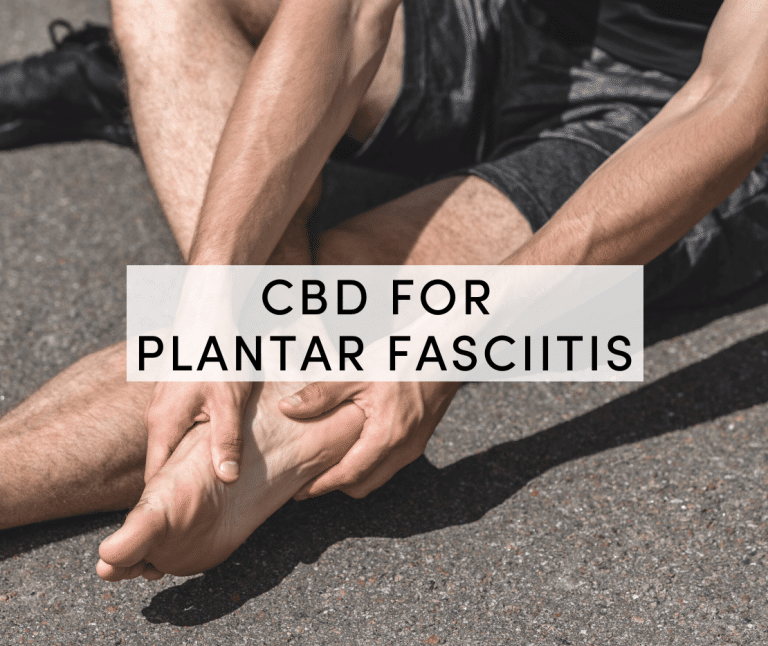CBD for Plantar Fasciitis: An Alternative Method for Easing Foot Pain?

Posted on May 4th, 2021
Plantar fasciitis is one of the many problems that athletes and runners face. If you have ever woken up in the morning and felt a stabbing pain in your heel after a few steps, chances are you have this condition. It is an inflammatory condition that prevents you from doing certain activities, which can be very limiting, especially if you’re an athlete. In this read, we’re going to look at plantar fasciitis in great detail and the various treatment options, including the use of CBD. This will better equip you with knowledge about CBD for plantar fasciitis.
What is Plantar Fasciitis?
This is one of the primary causes of heel and foot pain. Plantar fascia is the ligament that goes across the sole of your foot, attaching to the heel. When you over-stress and overstretch it on a regular basis, it may become inflamed and tear, leading to plantar fasciitis.
This condition is common in runners and athletes as they repetitively exert force on their feet and legs, putting stress on the plantar fascia. Shoes with poor support can also result in plantar fascia’s inflammation.
The Symptoms
Plantar fasciitis typically involves stabbing pains on the bottom of the foot towards the interior part of your heel. It results in limping, discomfort, and an extremely sensitive heel.
This condition’s severity can vary, but in most cases, you experience pain when you put your foot flat on the ground. It is most noticeable during the first few steps after you wake up in the morning.
When your heel starts to ache, you can put more pressure on its outside border, walk on the ball of the foot, or limp. Just like arthritis, the pain is usually excruciating. However, there are several lotions and creams that you can apply to help ease the pain. These creams can include CBD for plantar fasciitis. More on this later!
What Causes Plantar Fasciitis?
The most common causes of plantar fasciitis include constant stretching and tearing. This causes inflammation in the fascia plantar. That’s because this ligament, connecting the back and front of your foot, acts like a shock-absorbing bowstring, supporting the foot’s arch. When constant stress and pressure on the plantar fascia becomes too high, it can result in small tears leading to the excruciating pain and inflammation of this condition.
There are several risk factors that also contribute to the development of chronic foot pain. These include:
- Exercise- People who engage in activities that put extreme stress on the feet are more prone to developing plantar fasciitis. Some of these activities are:
-Ballet dancing
-Long-distance running
-Aerobic dancing
-Ballistic jumping
- Age- Older people have a higher risk of developing plantar fasciitis compared to younger individuals.
- Obesity- Excess weight tends to put more pressure on the plantar fascia, and thus a higher risk of developing this condition.
Treatment Options for Plantar Fascia
Before you take any medication, it’s imperative to consult a practitioner for the best regimen for your case. Some treatment options focus on preventing or recovering from the condition, while others treat the active symptoms, calling for a stronger reliever. CBD for plantar fasciitis is one option we will discuss. That being said, here are some of the available plantar fasciitis treatment options:
NSAIDs
Medications such as Non-steroidal Anti-inflammatory Drugs and steroids are some of the common treatment options for plantar fasciitis. However, they are not without substantial limitations and adverse side effects.
NSAIDs, for example, have been shown to be gastro-toxic and contraindicated in people suffering from ulcers. It’s imperative to factor in these side effects before taking any medication. Also, individuals with cardiovascular conditions and hypertension won’t find NSAIDs helpful when it comes to treating other symptoms. However, one of the reasons NSAIDs ease pain is because they are COX-2 inhibitors. Studies have found that CBD can also act as a COX-2 inhibitor.
Physical Therapy
When done in the form of activities that stretch and strengthen the plantar fascia, physical therapy can actually help alleviate the pain and inflammation. However, while these exercises and stretches help alleviate the pain, it’s temporary and can take a long time before complete relief happens.
Shockwave Therapy
This is a form of therapy that uses sound waves to make vibrations that shock the fascia. You can use shockwave therapy in tandem with physical therapy or medical treatment to manage the pain that comes with plantar fasciitis.
Salves, Lotions, and Creams
When in search of plantar fasciitis pain relief options, you’re bound to come across creams and lotions. During this quest, you’ll want to pick a manufacturer that includes ingredients focused on providing relief for the pain and inflammation.
The CBD Oil Option
CBD is one of the most common components in hemp and topical products in the form of oils, salves, and lotions. According to various studies, the manner in which CBD interacts with the receptors around the fascia can lead to pain relief. More about this in the following section!
 CBD for Plantar Fasciitis
CBD for Plantar Fasciitis
People who can’t withstand long periods of exercise may not be able to use physical therapy to manage plantar fasciitis. This has led to the evolution of many alternative treatment options for the condition, CBD being one of the more interesting ones. According to various studies, CBD may improve muscle and joint strength while boosting feet flexibility. But how substantial are these studies? To have a better understanding, we need to have a closer look at how CBD works and its relation to pain and inflammation.
What is CBD?
Short for cannabidiol, CBD is one of the many active compounds or cannabinoids in the cannabis plant. It is the second most prevalent cannabinoid after tetrahydrocannabinol or THC. By interacting with the endocannabinoid system (ECS), a complex signaling network responsible for most biological processes, CBD provides a wide array of potential health and therapeutic benefits, pain and inflammation relief being one of them.
Does CBD Make You High?
Unlike THC, CBD does not have psychotropic effects. It interacts with receptors both in the body and brain, but it does not lead to intoxicating effects. This is one of the primary features that make cannabidiol an appealing product to those after its benefits.
Does CBD for Plantar Fasciitis Work?
The endocannabinoid system is responsible for a wide array of bodily functions. It consists of CB1 and CB2 receptors, which interact with cannabinoids in order to keep the body functioning regularly. This means that when you consume CBD on a regular basis, you are likely to experience the benefits over time, including relief in your feet.
CBD For Foot Pain
Studies have established that CBD contains anti-inflammatory properties. Applying it topically can be a great option to promote long-term recovery for conditions like skin irritations, Achilles tendonitis, musculoskeletal pains, arthritis, and plantar fasciitis.
CBD for Swelling
Research shows that using CBD on a regular basis has an immunosuppressive effect on the cells responsible for immunity and inflammation. This substantially reduced the possibility of chronic inflammatory pain.
CBD For Chronic Heel Pain
Topical creams and lotions infused with CBD have analgesic properties that help alleviate the chronic symptoms of neuropathic pain.
CBD for Inflammation
Inflammation happens to be one of the most common symptoms of any condition. It is your body’s natural response to infections and it is very effective. However, inflammation isn’t always triggered by infections, but also injuries.
When you tear a muscle or fracture a bone, your body releases prostaglandins and histamines, both of which travel to the source of injury and cause pain and swelling.
Much of the endocannabinoid system interacts with the immune cells and given the abundance of cannabinoid receptors, this complex cell-signaling system influences most of the processes that happen during inflammatory responses.
An important thing to keep in mind is that physical pain usually calls for medicines with a targeted and instant effect. Some CBD products contain terpenes, which come in handy in treating the underlying causes of your foot pain symptoms. However, they tend to take longer compared to other pain and analgesic medications.
 Types of CBD for Plantar Fasciitis
Types of CBD for Plantar Fasciitis
While cannabidiol does offer health benefits over time, it’s advisable to consider supplementing other medications if you want instant relief. That’s because it can take hours for the compound to get into the feet and work effectively.
Some topical CBD products that claim to be rich in the compound are not as effective as the claim. Topical CBD bioavailability is often to blame for this. How much CBD actually makes it into your bloodstream varies greatly from product to product.
However, if you apply topical CBD before hitting the hay, or simply give it ample time to absorb, it has a better chance at lasting effects. It’s also imperative that you use a product with a high concentration of CBD in it, like Tanasi’s Muscle Rub. For even faster results, consider using CBD in a tincture form.
Final Thoughts
Using OTC anti-inflammatory and analgesic agents for pain and inflammation related to foot pain is a common practice nowadays. However, they are not without limits and side effects. CBD is safe even in extremely high doses, and has almost no serious side effects. Although the science is still new, CBD for plantar fasciitis may be a great alternative when it comes to treating the symptoms and underlying causes.






